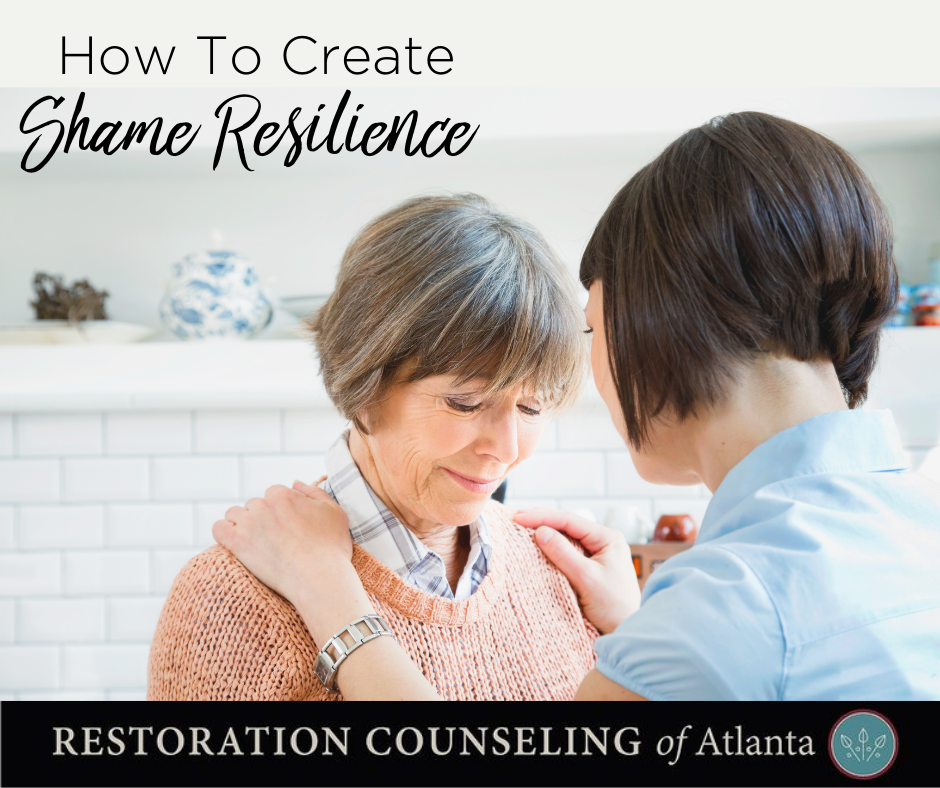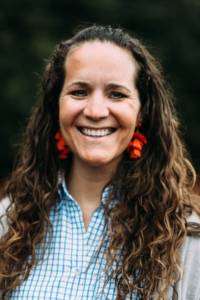Shame is a powerful feeling that can make someone feel isolated, stuck, and fearful. Brene Brown is a research expert on shame, and she has said in her book, Daring Greatly, that “shame cannot survive when spoken and met with empathy.” This quote provides a hopeful and life-giving antidote for combating shame. Brown also describes how shame does not want to be exposed or spoken but kept in the dark. There is a lot of evidence that naming an emotion can help decrease that feeling by 50%. Having heavy emotions or feelings is one thing but feeling alone in them makes them even worse. We are not meant to live in isolation but in community and connection, so having someone else to validate that is very powerful.
What is shame?
People get shame and guilt confused sometimes, so it’s essential to differentiate between the two. Shame is the belief I am a bad person, and guilt is the feeling that I did something bad (p.41). Brown describes shame as feeling inferior, not good enough, or not worthy of love. Shame is a collective human emotion that everyone experiences.
In her book, The Gifts of Imperfection, Brown says, “only people who don’t experience shame lack the capacity for empathy and human connection. We all feel afraid to talk about shame. The less we talk about shame, the more control it has over our lives” (p.38). She also says that shame can become out of control in our life when it is fueled by “secrecy, silence and judgment” (p.40). This idea furthers the point that talking about shame is a powerful way to combat those feelings. We can only heal from shame by having human connection and validation.
What is shame resilience?
Brown found in her shame research that people with high levels of shame resilience exhibit many similar characteristics. For example, they are aware of their shame messages and triggers. These people are also continually checking these shame messages that they hear and reminding themselves of the truth. They are open to being vulnerable and sharing with others how they feel shame. They are also comfortable naming that they feel shame and asking for what they need to help them work through that.
How do I handle shame?
Dr. Hartling is a former relational-cultural theorist at the Stone Center and says that there are three ways that people handle shame: (p.46)
They can move:
- toward someone by trying to please them,
- against by trying to gain power, or
- away from them by hiding themselves.
Men and women who are highly resilient to shame know when this is happening and express it to someone else. Brown says that shame often exhibits itself through physical feelings such as a racing heart or flushed face, or feeling worthless or stuck. (p.46)
How can I build shame resilience?
Vulnerability met with empathy is the key to combating shame. When someone tells their story to another person and feels heard, then the level of shame goes down. Here are some questions that Brown (p.47) encourages readers to ask themselves as they learn more about their shame messages and how to combat them.
- Who do you become when you are overwhelmed by shame?
- Do you move toward, away, or against people?
- How do you self-protect when you feel shame?
- Who do you call to work through shame?
- What is the bravest thing you can do for yourself when you feel unworthy and hurt?
It is important to find safe people that you can trust with whom to share your story. Doing this will normalize the feeling of shame instead of magnifying it. It’s important to ask yourself, who are the people I trust to hear my story? It is crucial to have at least one person in our lives who will acknowledge the pain and shame you might feel so that you may become a shame-resilient person.
mead@restorationcounselingatl.com, ext. 115
Roswell and Woodstock Locations
Mead counsels children, adolescents, adults, and families struggling with anxiety, depression, communication difficulties, grief, and other life issues. She is a certified PREPARE/ENRICH facilitator and also works with premarital couples. Mead’s sincere desire to help her clients experience freedom from fear. She is passionate about helping her clients get out of the rut they have experienced and into new, healthy relationship patterns. She will provide a safe environment for healing.


 by
by